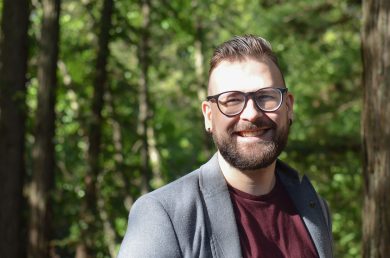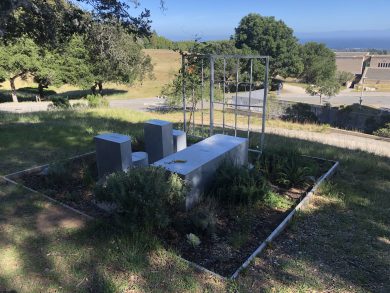Grad Profile: Phil Groth
 Phil Groth is a third-year PhD student in the Philosophy Department. Groth is one of three Graduate Student Instructors (GSI) teaching a Questions That Matter course on THI’s annual theme of Imagination this spring. Graduate student instructors are selected through a competitive process to collaboratively design a new syllabus with faculty guidance and teach Questions That Matter undergraduate courses on the Institute’s annual theme. THI’s program provides a valuable opportunity for graduate students to expand their pedagogical training with support from faculty mentors, peer mentors, and the Center for Innovations in Teaching and Learning. The courses they teach inspire undergraduate students to find deep meaning, relevance, and value in the humanities as they engage in thought-provoking discussions about critical issues in our current historical moment.
Phil Groth is a third-year PhD student in the Philosophy Department. Groth is one of three Graduate Student Instructors (GSI) teaching a Questions That Matter course on THI’s annual theme of Imagination this spring. Graduate student instructors are selected through a competitive process to collaboratively design a new syllabus with faculty guidance and teach Questions That Matter undergraduate courses on the Institute’s annual theme. THI’s program provides a valuable opportunity for graduate students to expand their pedagogical training with support from faculty mentors, peer mentors, and the Center for Innovations in Teaching and Learning. The courses they teach inspire undergraduate students to find deep meaning, relevance, and value in the humanities as they engage in thought-provoking discussions about critical issues in our current historical moment.
As the Spring Quarter draws to a close, we reached out to talk with Groth about his experience teaching the Imagination course as a GSI. We discussed how the course has progressed, the intellectual questions animating class discussions, and the significance of the course for Groth’s pedagogical development.
Hi Phillip! Thank you for sitting down to talk with us about your experience thus far as a Graduate Student Instructor (GSI) for THI’s Questions That Matter course on Imagination. You’re more than halfway through the quarter and we’d love an update on how the course is going! What are you reading? What exciting questions or insights about Imagination have come up?
 Thanks! I think the course is going quite well. We started the quarter with some questions about philosophical issues with imagination. We talked about difficulties, both conceptual and ethical, with imagining the experiences of others. Taking Thomas Nagel’s famous article, “What Is It Like to be a Bat?,” as a starting point, we discussed how imagination might be an inadequate tool for gaining knowledge about what it is like to be a certain creature. This has also consequences for what we think about experiences of people who differ from us in some significant ways, and even ourselves after going through experiences that profoundly change us. We also talked about the role of imagination in various humanities disciplines, from history and sociology to Black Radical Thought.
Thanks! I think the course is going quite well. We started the quarter with some questions about philosophical issues with imagination. We talked about difficulties, both conceptual and ethical, with imagining the experiences of others. Taking Thomas Nagel’s famous article, “What Is It Like to be a Bat?,” as a starting point, we discussed how imagination might be an inadequate tool for gaining knowledge about what it is like to be a certain creature. This has also consequences for what we think about experiences of people who differ from us in some significant ways, and even ourselves after going through experiences that profoundly change us. We also talked about the role of imagination in various humanities disciplines, from history and sociology to Black Radical Thought.
If you had to choose just one, what would you say has been the highpoint of the course so far? What aspect of the course has been most challenging?

I think that one of the highlights was our field-trip to the Solitary Garden. It is a participatory art installation near Baskin Art Studios at UC Santa Cruz created as a result of collaboration between the artist jackie sumell and Tim Young, who is on Death Row at San Quentin Prison. Young spent over 20 years in solitary confinement and the installation is a recreation of a prison cell, similar to the one Young is in, surrounded by a small garden. We spent an hour and a half talking about this sculpture, the American prison system, abolition, and the role of imagination in planning for a future.
The most challenging part of the course for me has been overcoming the sense of inadequacy as a first-time instructor. Although I spent a lot of time preparing to teach this course, I was still feeling intimidated by the fact that I’m the one running things this time. The fact that this is an interdisciplinary course added to the intimidation factor. I often had to change my perspective on how I think about “imagination.” As a philosopher, I have certain ideas about what imagination is and how it is used. This does not always reflect how other disciplines conceive of it. Working through readings in other humanities disciplines forced me to pause and really think through “what does the author mean by ‘imagination’ here? How is this different from my understanding?” I think this was a valuable exercise for me. I have a wider perspective now and can appreciate better the ways in which various humanities benefit and compliment each other. Often we can miss some important things when we get too caught up in our own understanding of various issues.
Why do you think it is so important to have a course that explores imagination in our historical moment?
One thing about imagination is that it is not always a solitary endeavor. We often imagine collectively, in groups.
I think this is as important now as it was at any other point in history. I think there are some practical issues that have impact on how we live our lives and how we interact with others. For example, reading Nomy Arpaly’s work on the trouble with imagining experiences of other people helps us understand how unreliable our imagination can be in this context. We often rely too heavily on our imagination when we try to understand others. This can lead us to forming false beliefs about them and that, in turn, can often have a negative effect on our relationships.
As for our specific historical context, I think we are in a kind of transitional period. Increasingly, we have been becoming more aware of various social problems, like mass incarceration, police brutality, various forms of inequality, etc. One thing about imagination is that it is not always a solitary endeavor. We often imagine collectively, in groups. Now, as a society, we are trying to imagine a world in which those various problems are addressed. We imagine what such a world would look like, how do we get there, and how do we fix things that need fixing.
How has this GSI experience supported your pedagogical development?
For one, I finally had the opportunity to be a primary instructor for an undergraduate course. This is a great experience that I’ve been waiting for since my undergraduate years. I think I got a lot of practice in running a class efficiently and in facilitating valuable discussions. I also find myself much more comfortable with interdisciplinary work. I think that academia in general is moving towards interdisciplinarity and I feel much more confident now in my ability to teach and facilitate interdisciplinary work.
While teaching, you also have been working on your own research and writing as a PhD student in the Philosophy Department. How do you think your work as an instructor for this course has interacted with and deepened your scholarship?
In all honesty, imagination is only indirectly connected to my current research. Right now I am working on a project about the relation between perception and rationality. Specifically, I’m interested in cases where our biases, beliefs, and attitudes cause us to see the world differently than we ought to. This further reinforces those biases and beliefs. Susanna Siegel calls this “hijacked perception” because the person who falls prey to this phenomenon does not know this is happening to them. For example, a vain musician might see approving looks on the faces of his audience, despite the fact that no one actually is impressed with his music and thus no one has an approving look on their face. Here, the musician “deceives” himself in order to protect some important belief (such as “I am a great musician”). I think that imagination can enter this picture when we ask what kind of phenomenon is this improper seeing. Are those experiences cases of imagination or something else? I’m not sure what the answer is and this is perhaps a question for a future project.
